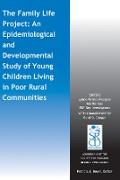The Family Life Project
BücherAngebote / Angebote:
About 20% of children in the United States live in rural communities, with child poverty rates higher and geographic isolation from resourcesgreater than in urban communities. Yet, there have been surprisinglyfew studies of children living in rural communities, especially poorrural communities. The Family Life Project helped fi ll this gap byusing an epidemiological design to recruit and study a representativesample of every baby born to a mother who resided in one of sixpoor rural counties over a one year period, oversampling for povertyand African American. 1, 292 children were followed from birth to36 months of age. This study used a cumulative risk framework toexamine the relation between social risk and children's executivefunctioning, language development, and behavioral competence at36 months. Using both the Family Process Model of development andthe Family Investment Model of development, observed parenting wasexamined as a mediator and/or moderator of this relationship. Resultssuggested that cumulative risk predicted all three major domains ofchild outcomes and that positive and negative parenting and maternallanguage complexity were mediators of these relations. Maternalpositive parenting was found to be a buffer for the most risky familiesin predicting behavioral competence. In a fi nal model using bothfamily process and investment measures, there was evidence ofmediation but with little evidence of the specifi city of parenting forparticular outcomes. Discussion focused the implications for possibleintervention strategies that might be effective in maximizing the earlydevelopment of these children.
Folgt in ca. 15 Arbeitstagen




